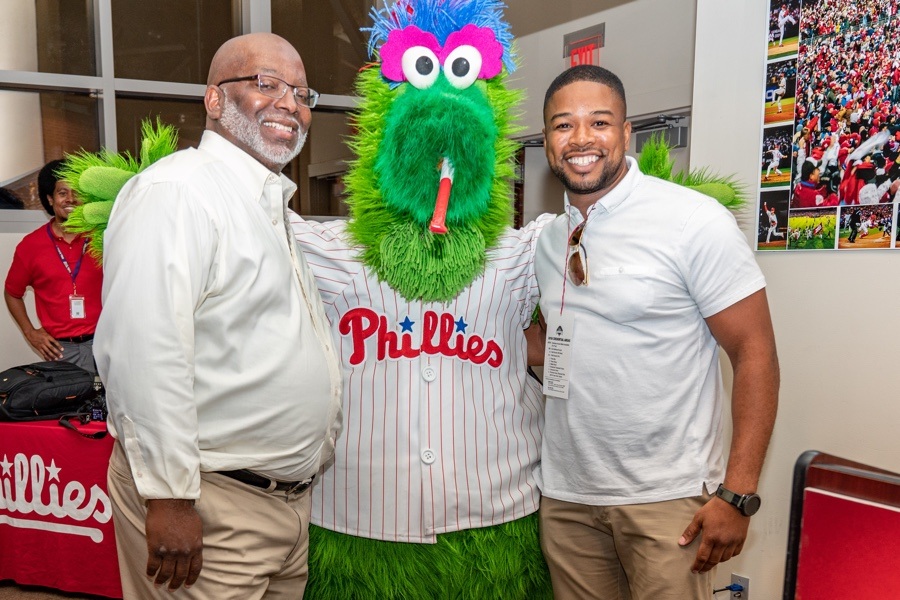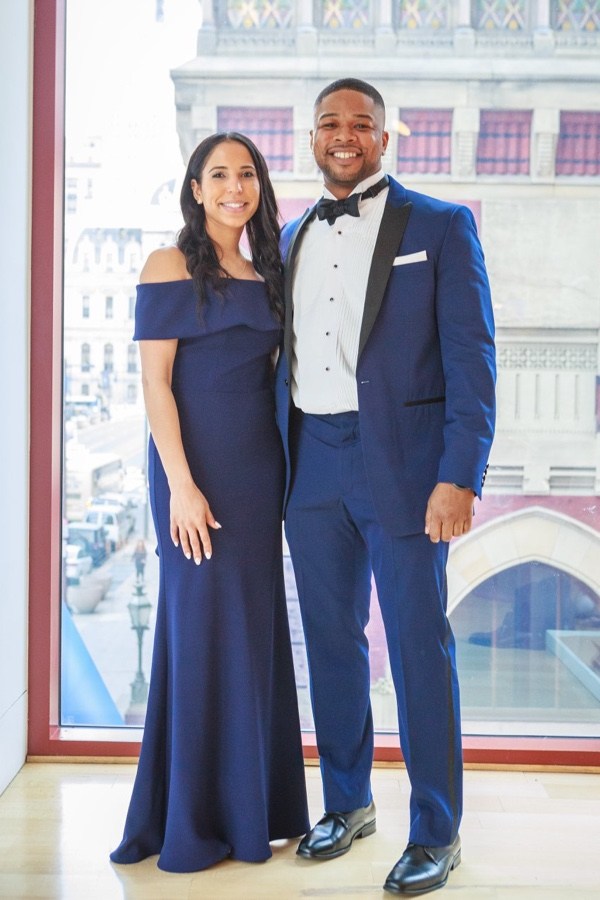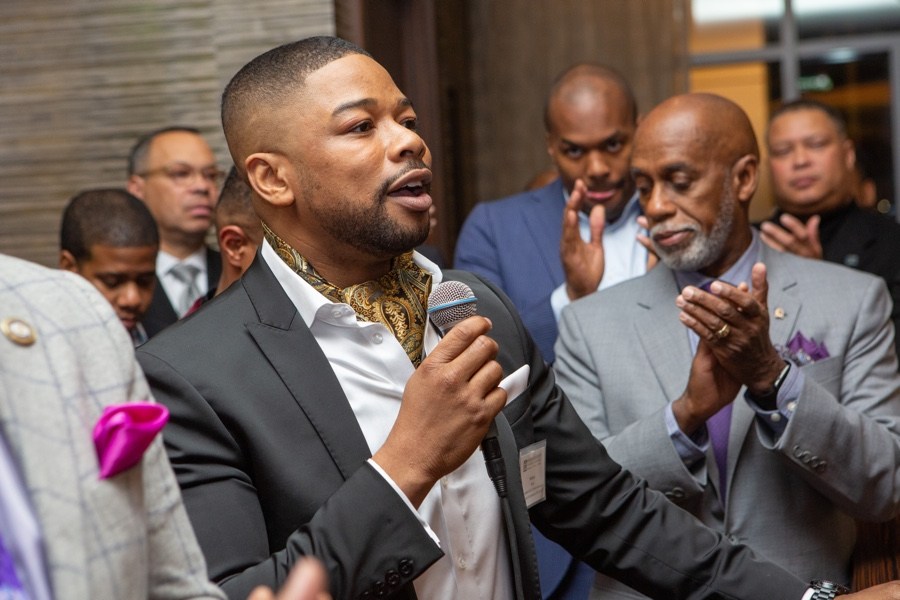I Love My Job: AACC President Michael Banks
Here’s why the leader says the effort to support the region’s black-owned businesses is much bigger than any one person.

Michael Banks giving opening remarks at an AACC sponsored event with Lauren Simmons in July. Courtesy photo.
African-American Chamber of Commerce president Michael Banks is passionate about cultivating leaders and spreading opportunity. And as the leader of an organization that plays a key role in empowering and enhancing black-owned businesses across the Delaware Valley, Banks has positioned himself to do just that. “We have to give people the opportunity to lead and make change,” Banks tells Philly Mag. Here’s why he says the effort to support the region’s black-owned businesses is much bigger than any one person.
I grew up in… North Philly around 27th and Cecil B. Moore. I’m a local kid.
Growing up, I dreamt of becoming… At first, like every other kid, I wanted to be a doctor. But that changed at 15 when I switched it up and told myself I wanted to play for the NFL. I was pretty good at sports.
A big lesson I’ve learned leading the African American Chamber of Commerce is… people will always surprise you when you give them an opportunity. From an internal standpoint, with the team members I’ve had the fortunate opportunity to work with, I’ve been able to give them an assignment and watch them over deliver. But you have to give them that opportunity. Externally, I’ve learned that changing people’s mindsets isn’t easy. You have to help people understand the value that your organization brings to them. If you’re going to be successful in this type of work, it’s something you have to figure out.

Michael Banks and AACC Board Chairman Steven Bradley with the Phillie Phanatic at an AACC Quarterly Meeting sponsored by the Philadelphia Phillies in August.
The state of black-owned businesses in Philadelphia is… promising. There are a lot of businesses doing great work that people don’t know about. We try to bring those organizations and businesses to the forefront. There is the potential to do a lot more if we can better align resources.
Something I love about my job is… I have an amazing team. I get to meet some amazing people, and I get invited to eat food a lot. And I like eating food, so that’s really awesome!
I’m most productive when I… have a lot to do. I like chaos. I can’t explain it, but I absolutely love chaos. It’s an adrenaline rush for me. I like to have a lot going on.
The best word to describe the business owners I work with is… optimistic.
Some new Philly businesses I’m excited about are… the businesses coming online in the restaurant scene. I’m also excited about some of the nontraditional things, like all of the pop-up businesses. For example, the businesses that set up at Dilworth Park during the holiday time.
My daily schedule usually involves… talking with a lot of people and responding to a lot of communications. It’s really nonstop managing of relationships.
I relax by… reading books and traveling. I recently read University of Success by Og Mandino. It’s a really good book. I traveled to Denver, Seattle, and Turks and Caicos this year. It’s always good to go to different markets and places to see how different people live and operate. It helps me unplug to see different things and different people.

Michael Banks with his girlfriend Mary Holloway at the AACC’s 25th Annual Meeting & Awards Ceremony held at the Pennsylvania Academy of the Fine Arts (PAFA) this past April. Courtesy photo.
My secret talent is… I can eat really, really spicy food. And I can play the drums!
One key way the AACC supports black-owned ventures is… by providing education. You don’t know what you don’t know. Through our programming we are also building a community of people who are bringing resources to us to share and make the community better, instead of leaving businesses isolated.
A big challenge facing black-owned businesses in Philly is… access to capital. It applies to all minority groups. There’s also a lack of access to opportunities.
The benefits of launching a business in Philly include… instantly getting a diverse customer base. There’s always going to be someone looking for your product versus places that are homogenous. Philadelphia has a diverse group of customers that are helping businesses be sustainable. In addition to that, I’d say proximity. You’re always two hours from New York or D.C.
One thing City Hall can change to better support local business owners is… enforcement of laws on the books that are in place to help disadvantaged business owners. Sometimes they’re not enforced as strongly as they can be. For example, we look at minority participation numbers. The relationship between the client that gets the contract and the sub that they work with, which in most cases will be a minority business owner. The city can make sure that person is a part of the project and not just on a piece of paper and make sure that person is being paid and paid on time. That’s critical.
Another thing they can do is make information easier to access. If I need to do XYZ, I should know exactly where to find it. I shouldn’t have to look all over the place for it. Things should be in a centralized location, like on one website or platform.
I got offered a job with the Philadelphia Stock Exchange on the spot when I… The first time I had the opportunity — it happened several times — I passed the math test in like 20 minutes. I was immediately asked, “When can you start, Mr. Banks?” I did really well, apparently.
The policies the AACC stands for are… centered on inclusion and opportunity. We’re looking at things like, how do you count minority business participation? Are you looking at it through the lens of revenue or through the lens of the amount of jobs being awarded? We focus on the revenue side because if you can put more revenue into these businesses, that’s how they grow and succeed. That’s how they get to the next level and hire other employees that are also going to be disadvantaged in a lot of instances.
In addition, as neighborhoods change, we’re making sure that the businesses that want to stay there have the opportunity to do so. We want businesses to be aware of the policies that are being enacted and resources available to members of their community. We’re always looking at ways to do that so if you’ve had a business for 20 years and the neighborhood becomes gentrified, you’re not forced out of there. It’s important to us that businesses can remain. Also, after different corridors are changed, we want to make sure they are zoned in a way that is advantageous for both residents and businesses.

Michael Banks giving opening remarks at the 2018 AACC Holiday Party held at SugarHouse Casino on December 6 along with AACC Board Members. Courtesy photo.
Diversity is… more than what I see. If you’re just saying, “I want to put more Black or Hispanic people in the room,” that’s not necessarily what diversity is in totality. You have to be mindful of people’s mindsets and their culture. There are a lot of things you cannot glean by just looking at an individual. When you’re trying to be intentional about diversity, there are lot of factors that go into it that go beyond what you can see when you look at an individual.
Being successful is… becoming what you want to be and not allowing outside influences to let you deviate from your idea of what success is.
A mantra I live by is… short-term sacrifice for long-term rewards. That drives me everyday. I have to give things up in the interim for the things I really want.
In five years I hope to… have made an impact in the growth of black-owned businesses. I want to be able to look back and see that, because we helped businesses, we were able to help drive down poverty in the city. I also want to be able to say, to myself, that I helped develop leaders that are making a difference in the city and beyond. That’s important to me. It’s way bigger than one individual. We have to give people the opportunity to lead and make change. That’s why I do what I do every day.


